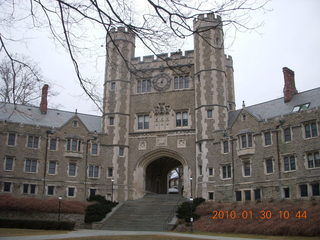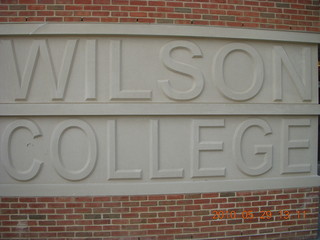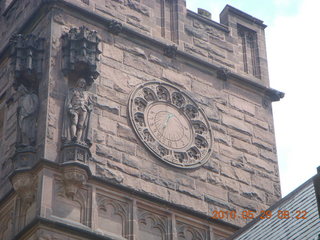WOODROW WILSON AND RACISM
2016 May 2, Monday
"I'm shocked,
shocked!,
to find that gambling is going on in here!"
 Princeton University has honored and revered Woodrow Wilson,
Class of 1879.
He was born in Virginia in 1856,
was Princeton's President 1902-1910,
was President of the United States 1913-1920,
and died in 1924.
(Trivia question, what was Woodrow Wilson's middle name?)
The Wilson School of Public and International Affairs
is revered worldwide and was Princeton's only selective major
when
I was there as a member of the Class of 1978.
I lived in Wilson College,
one of the residential communities.
Wilson's name is just about everywhere.
Princeton University has honored and revered Woodrow Wilson,
Class of 1879.
He was born in Virginia in 1856,
was Princeton's President 1902-1910,
was President of the United States 1913-1920,
and died in 1924.
(Trivia question, what was Woodrow Wilson's middle name?)
The Wilson School of Public and International Affairs
is revered worldwide and was Princeton's only selective major
when
I was there as a member of the Class of 1978.
I lived in Wilson College,
one of the residential communities.
Wilson's name is just about everywhere.
Historically,
Wilson was a Democrat
and is associated with the Progressive movement.
He openly rejected the traditional values
in the Declaration of Independence and
the Constitution of the United States
declaring them "obsolete."
Recently, there has been a furor
that revered Princeton hero Woodrow Wilson
was a racist,
in particular that he didn't like Negroes
(as Blacks and African Americans were called in his time).
I think it's worth a moment to reflect
not on his racial attitudes
but on the notion that they're a surprise to anybody
with a high school diploma,
not to mention an Ivy-League-college education.
THEN
 In 1854,
two years before
Presidents Wilson was born,
the Democratic-Republican party split into the
Democratic Party pushing to extend slavery in the United States
and the abolitionist Republican Party opposing slavery entirely.
A bloody war was fought over the race-slavery issue
with the Republicans winning in 1865.
What ensued from that conflict
in the Democratic Party were
Jim Crow laws
to keep Blacks segregated
and an underground organization called
the White Knights of the Ku Klux Klan.
Both of these were vehemently racist
and both were fundamental parts of Wilson's Democratic Party
and fundamental parts of the Democrat-Republican difference.
From 1854 through 1912, it was all about race.
In 1854,
two years before
Presidents Wilson was born,
the Democratic-Republican party split into the
Democratic Party pushing to extend slavery in the United States
and the abolitionist Republican Party opposing slavery entirely.
A bloody war was fought over the race-slavery issue
with the Republicans winning in 1865.
What ensued from that conflict
in the Democratic Party were
Jim Crow laws
to keep Blacks segregated
and an underground organization called
the White Knights of the Ku Klux Klan.
Both of these were vehemently racist
and both were fundamental parts of Wilson's Democratic Party
and fundamental parts of the Democrat-Republican difference.
From 1854 through 1912, it was all about race.
Princeton University was no haven for Blacks at that time.
It wasn't until 1942 that Princeton admitted its first Black students.
The left-wing Democrats
formed
a new movement during
Wilson's time in the White House,
the belief that Science should be an important part of public policy.
The science-in-politics of the day was called "eugenics."
In its noble form, it was a quest to produce better human beings
through selective breeding.
The dark side of eugenics was a quest to remove
"imbeciles" (Blacks mostly) from the population
through forced contraception and sterilization.
In 1920 Margaret Sanger formed
the Planned Parenthood organization to carry out the
mission of forced contraception of Blacks.
This was part of the Progressive political views
that Wilson actively promoted.
So what racial view do we expect of a political figure
in a party that promoted slavery and forced segregation,
suppressed Blacks both politically and violently,
and created a scientific mission to breed Blacks out of the population?
I believe anybody other than a racist person
would have been vehemently repelled by those views.
So Wilson was racist
and I think it's obvious he had to be racist.
Does that make him a bad person?
Was widely-admired folk-singer Pete Seeger
a bad person for supporting
Stalin, Hitler, and Ho Chi Minh?
That's a decision for another place and another time,
but the realization that Woodrow Wilson
had less-than-pure thoughts on the subject of
Black people in America can't possibly surprise
anybody who is paying attention.
We could ask why those who supported
Wilson's role in history weren't paying attention
to his race attitudes and policies.
My point here, in this section, is that Wilson's racism
had to be clear then, now,
and at any point in history between then and now.
The notion that somehow we discovered
Wilson's racism is as credible as Captain Renault's
exclaiming that he's shocked, shocked!,
to find that gambling in Rick's casino,
in the classic movie "Casablanca."
This fuss has the awful aroma
of somebody publicly making the racism point about Wilson
and the Old-Princeton community doing damage control
by feigning outrage.
"Gosh, we didn't know!"
and
NOW
 So let's explore why the Princeton community
may not have been as sensitive to racism
as I think they should have been.
(This is the not-so-nice part of my essay, by the way.)
So let's explore why the Princeton community
may not have been as sensitive to racism
as I think they should have been.
(This is the not-so-nice part of my essay, by the way.)
There has been a community here in the United States of America
that felt that the institution of slavery
and its accompanying racism were terrible things.
It's easy to identify that movement with the nineteenth century,
the abolitionists and those who fought Jim Crow laws.
Today we all seem to agree
that Jim Crow laws were terrible,
but the issues and attitudes are still with us,
more than ever I think.
What happened to Jim Crow?
It became forced segregation.
When the civil-rights movement rubbed progressive noses in their dirt,
it became forced integration and, more recently,
the vile racism of Affirmative Action.
If they couldn't keep Blacks away,
then they could infantilize and marginalize them.
"He got the job because of racial preference."
When this preference is true much of the time,
it puts terrible pressure on those who really earn it.
Additionally, Affirmative Action makes Blacks
dependent on the liberal-progressive community for their livelihood,
a good way to keep them voting Democrat.
So where did Princeton University stand on these issues?
Did it stand up for racial equality and equal treatment?
Alas, no, it did not.
Prior to the civil-rights movement,
it simply made it very difficult for Blacks to enroll.
Afterward, in response to public sentiment,
and more in response to federal funding,
it instituted racially-biased policies in admission.
I understand the White-Black difference has been
about 200 SAT points or two full grade points,
the difference between an A student and a C student.
Alternative courses were developed for the new students
who didn't meet the standards.
When I was at Princeton 1974-1978
the whole race issue was cloaked
in doublespeak and secrecy and lies.
The housing agency vehemently denied there was any race component
in freshman room assignment.
They claimed roommate assignment was random
which would have meant a 12% Black community would have
22.5% mixed-race doubles (do the math)
while there were almost no mixed-race roommates in reality.
When they could choose their rooms and roommates,
most Black students chose to live together
in the New New Quad south of Wilson College.
There was clearly a
Black Princeton
within our university.
There was a community of Black students who didn't hang out there.
They chose to be a part of White Princeton,
they lived in dormatories
north of "Goheen Walk" (on Google Maps),
and they took traditionally Princeton-hard courses.
I knew one fellow who carefully avoided sending pictures
on his graduate-school applications so he would be chosen
for his merits and not his skin color.
With this understanding of Princeton's attitudes on race
through the twentieth century and beyond,
is it a surprise that they wouldn't look too closely
at racial attitudes of an important figure in its history?
If you sympathize with this essay,
then
here
are my other American-issues essays.
THE ADAM HOME PAGE
adam@the-adam.com
 Princeton University has honored and revered Woodrow Wilson,
Class of 1879.
He was born in Virginia in 1856,
was Princeton's President 1902-1910,
was President of the United States 1913-1920,
and died in 1924.
(Trivia question, what was Woodrow Wilson's middle name?)
The Wilson School of Public and International Affairs
is revered worldwide and was Princeton's only selective major
when
I was there as a member of the Class of 1978.
I lived in Wilson College,
one of the residential communities.
Wilson's name is just about everywhere.
Princeton University has honored and revered Woodrow Wilson,
Class of 1879.
He was born in Virginia in 1856,
was Princeton's President 1902-1910,
was President of the United States 1913-1920,
and died in 1924.
(Trivia question, what was Woodrow Wilson's middle name?)
The Wilson School of Public and International Affairs
is revered worldwide and was Princeton's only selective major
when
I was there as a member of the Class of 1978.
I lived in Wilson College,
one of the residential communities.
Wilson's name is just about everywhere.

